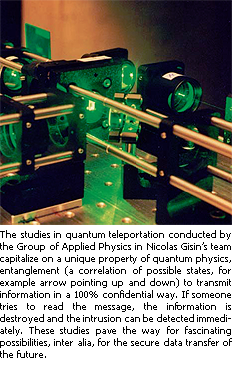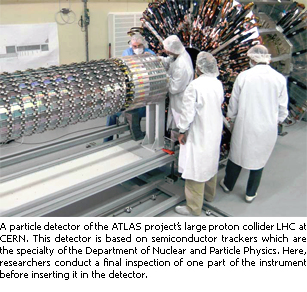Physics
In Geneva, fundamental and applied research of the highest level is conducted in different areas of physics. Geneva is a top choice for researchers and students alike because of the superior level of its research and the excellent training and supervision offered here.

What is studied in Geneva and why?
Researchers at the National Center of Competence in Research MaNEP (see p. 6-7) are interested in the comprehension and the development of new electronic materials. These new compounds, with their exceptional properties, will play a key role in the technologies of the future. Particle physicists, who benefit from the proximity of CERN with which the university works in close collaboration, study the basic constituents of matter in an effort to better understand the universe that surrounds us. In theoretical physics, studies on gravitation and cosmology are conducted alongside those on nanoscopic systems. The latter systems have properties in which the undulatory nature of electrons plays a key role and causes surprising and remarkable behaviors which could be used, for example, in quantum computers.
In the Group of Applied Physics, both fundamental and applied research are conducted, in quantum optics, bio-photonics, and on superconducting materials. In the field of optics, studies on quantum communication and teleportation are opening up amazing possibilities for the safe and secure transfer of information.
The fact that we accept a limited number of students allows us to guarantee teaching, training and supervision of the highest quality. The Section of Physics offers a complete range of programs: bachelor, master, and doctorate in accordance with the Bologna system.

